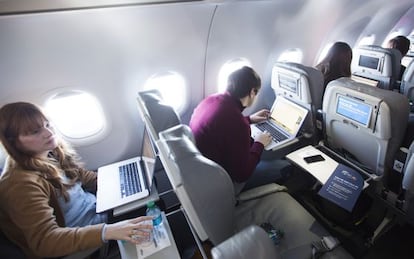Why Spain’s high-speed travel networks are slow to offer Wi-Fi
Taking the train or in-demand air routes usually means being without a connection

Despite growing demand, internet access continues to be something of a rarity on Spanish public transportation.
Around 40 airlines offer Wi-Fi, including former Spanish flag carrier Iberia, but only seven or so provide it for free.
Things aren’t much better on the railways, although Spain’s RENFE has promised to provide high-quality connections on its AVE high-speed routes, as well as at its Cercanias commuter stations.
It is an improvement to our service, like the VIP suite, fast-track boarding, or VIP parking. We don’t see it as a business in itself”
Iberia spokesperson
Meanwhile, AENA, the airport authority, has announced a plan to roll out free and pay-to-use Wi-Fi at Spain’s 46 airports.
Until then, travelers in Spain who want to stay connected while on the move overwhelmingly have to use their smartphone cellular network.
The technology to provide internet access aboard airplanes has been available for around five years, but the companies that do offer a connection impose restrictions on use. In most cases it’s limited to using messaging service WhatsApp, checking e-mail, and maybe a quick look at a website.
Airlines tend to see internet access as an added service rather than an essential feature. In most cases, the service was first available in business class, and then extended to other passengers.
“It is an improvement to our service, like the VIP suite, fast-track boarding, or VIP parking. We don’t see it as a business in itself,” says Iberia.
Iberia began offering internet access in July 2014, and the service is now available aboard 23 long-haul routes on its Airbus 330 and Airbus 340 aircraft, which fly to the US and Latin America, among other destinations. The company says that most passengers use between eight and 10 megabytes, while prices vary between $4.95 (€4.50) for four megabytes and $19.95 for 22 megabytes. After that, each megabyte costs $1.75.
Flat rate
Other companies, such as Lufthansa and KLM, apply a flat rate for the entire journey. The German carrier charges €9 an hour, €14 for four hours and €17 for up to 24 hours. The Dutch company charges €10.95 per hour and €19.95 for a maximum of 24 hours.
British Airways, now Iberia’s partner in IAG, only offers internet access on its New York routes. IAG says it intends to roll out the service through the Inmarsat satellite in 2016.
AENA, the airport authority, has announced a plan to roll out free and pay-to-use Wi-Fi at Spain’s 46 airports
Generally speaking, US airlines are more advanced than their European counterparts, and also cheaper. US Airways offers Wi-Fi on 90 percent of its routes, costing €14 per day, or €39 for a month. American Airlines and Delta charge the same daily rate and €49.95 for unlimited monthly use.
Among the few companies that do offer free internet access are Emirates, JetBlue, Norwegian, Turkish, Air China, Philippine Airlines, Hong Kong Airlines, and Nok Air.
Of these, Norwegian has the most routes in Europe, with 99 aircraft, 87 of which have onboard Wi-Fi. It says around half of passengers use the service.
Iberia says most passengers use its internet service just after take-off and shortly before landing. Regarding the quality of its connection, the company admits this can vary considerably: “Everybody using WhatsApp isn’t the same as people surfing the internet, which uses a lot more bandwidth,” says a source at the company.
Connection speeds could be considerably improved by using satellites. Telefónica and Vueling have announced a high-speed service of up to 20 megabytes per second using a satellite connection. When it receives permission from Spain’s civil aviation authority over the course of 2016, Vueling will be the first airline in Europe to offer high-speed broadband internet access.
Air Europa intends to offer Wi-Fi aboard its fleet of eight Boeing 787 Dreamliners in 2016.
No access on high-speed trains
Spain has the world’s most extensive high-speed rail network, but although its trains can travel at speeds of up to 350 kilometers per hour, they don’t offer good internet access.
Passengers face constant interruptions, and the company admits it is one of the biggest complaints it receives. RENFE says it is now working with Telefónica to provide Wi-Fi on the AVE and at commuter stations, and will roll out the service over the coming decade at a cost of €146 million.
RENFE says it intends to offer free Wi-Fi connections for essential services such as e-mailing and navigation, along with a pay service for faster downloads.
The service has already been tested aboard AVE routes between Madrid and Barcelona, and the company says it will roll it out to other routes over the coming two years. RENFE has invested €40 million in the required 4G and satellite infrastructure
AENA says it is working with Eurona Telecom Wireless to provide free, unlimited internet access at the 46 airports it manages, through which approximately 200 million passengers take off and land each year.
The freemium low-speed service will only allow passengers to check e-mail. The premium service, at speeds of up to 10 megabytes per second, will cost a minimum of €4.90 for up to 24 hours.
Tu suscripción se está usando en otro dispositivo
¿Quieres añadir otro usuario a tu suscripción?
Si continúas leyendo en este dispositivo, no se podrá leer en el otro.
FlechaTu suscripción se está usando en otro dispositivo y solo puedes acceder a EL PAÍS desde un dispositivo a la vez.
Si quieres compartir tu cuenta, cambia tu suscripción a la modalidad Premium, así podrás añadir otro usuario. Cada uno accederá con su propia cuenta de email, lo que os permitirá personalizar vuestra experiencia en EL PAÍS.
¿Tienes una suscripción de empresa? Accede aquí para contratar más cuentas.
En el caso de no saber quién está usando tu cuenta, te recomendamos cambiar tu contraseña aquí.
Si decides continuar compartiendo tu cuenta, este mensaje se mostrará en tu dispositivo y en el de la otra persona que está usando tu cuenta de forma indefinida, afectando a tu experiencia de lectura. Puedes consultar aquí los términos y condiciones de la suscripción digital.









































